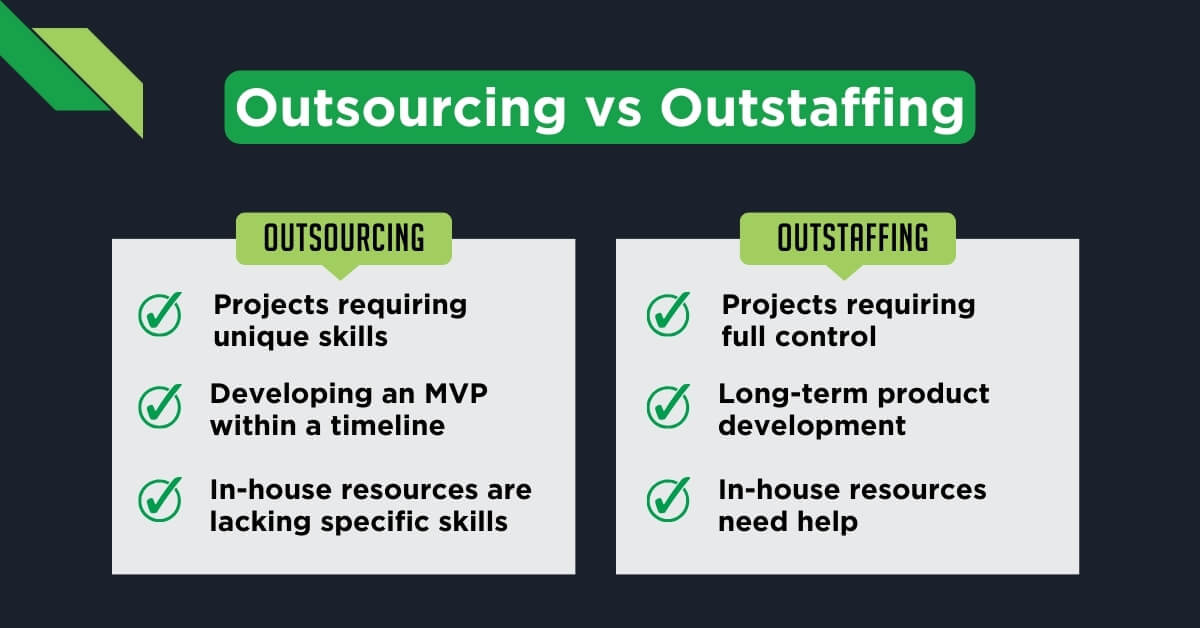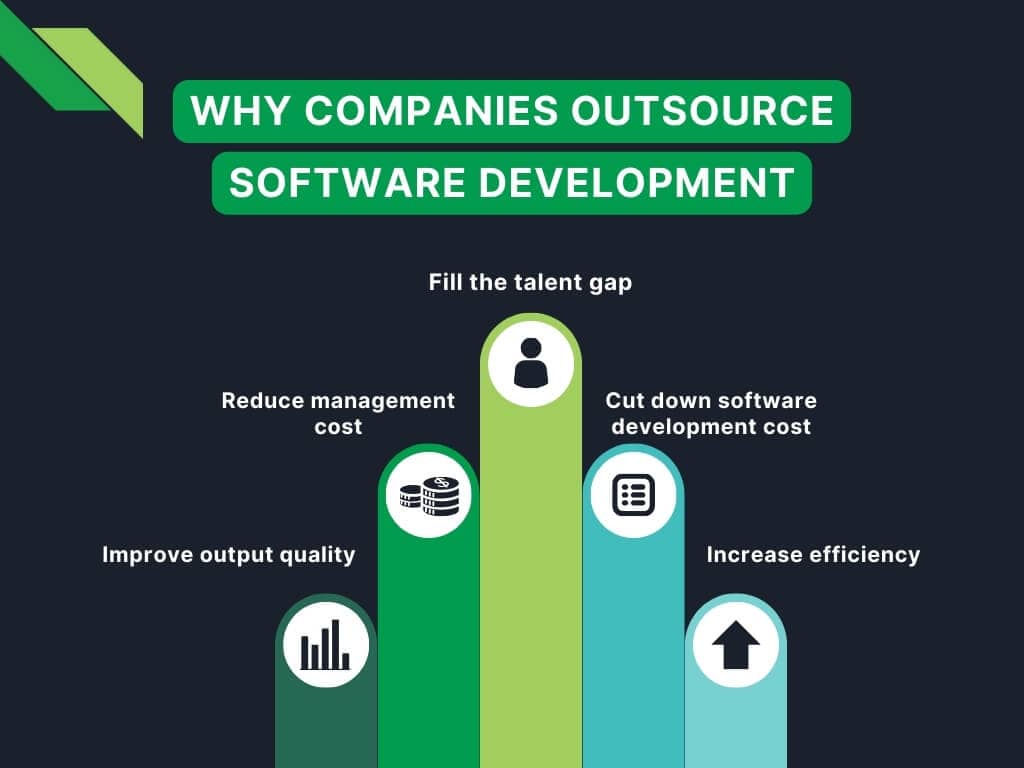Last Updated on 2025-02-13
There are changes in worker dynamics that businesses should know about. And how do others respond? An increasing number of US companies are using outsourcing and outstaffing strategies to expand their recruitment tactics.
These models have emerged as successful solutions to talent shortages. They give firms access to a global pool of skilled individuals.
Companies that use outsourcing and outstaffing can negotiate recruitment hurdles and tap into varied skill sets. Through these strategies, they can significantly boost their capabilities.
Navigating the Business Victory Lane: Outsourcing or Outstaffing?
The decision between outsourcing vs. outstaffing can significantly impact organizational efficiency and growth. So, navigating the nuances of these two approaches is essential.
Understanding Your Business Needs
Before choosing to outsource or outstaff, understand your unique business requirements. Assess the volume and complexity of your projects. Look into the expertise required to get them across the finish line. And determine whether these tasks are core to your business or peripheral.
Ask yourself:
- How many developers do you require?
- What skills and experience are needed?
- What is the nature of your business?
Example of Team Recruitment for Website Development Project
| Role | Project Assignment | Tech Experts Needed |
| Project Manager | Team Management | 1 |
| Tech Lead | Team Management | 1 |
| Software Developer | Implementation of Project Requirements | 3 |
| QA Tester | Test Case Documentation | 2 |
| UX Designer | Interface Design | 1 |
Having the answers will ensure you and your potential service provider are on the same page.
Defining Success for Your Company
Defining what success looks like for your company is pivotal before choosing outsourcing or outstaffing. Pinpoint your business goals, establish clear metrics for success, and determine how additional support can help you win your growth race.
- Are you looking to scale quickly or strengthen your core team?
- How will you measure the return on investment?
- What outcomes will signify a ‘victory’ for your project or company?
Breaking Down the Basics: Outsourcing vs. Outstaffing
By breaking down the basic differences between the two, you can decide which approach best aligns with your requirements.
Outsourcing Defined: More Than Just Delegation
Outsourcing is akin to hiring an outsourcing company and handing your car’s engine to a trusted mechanic. No, it’s not just about delegation. It’s also about entrusting an entire project—from initiation to completion—to an external agency, the outsourcing provider. This vendor takes the reins and drives your project forward with their dedicated team, equipped with the necessary tools and expertise.
Outsourcing, like outstaffing, allows for a strategic approach to talent outsourcing. It provides access to specialized skills and entire teams while relieving the client company of the intricacies of direct management.
It’s a comprehensive approach where:
- The outsourcing company manages the full project lifecycle.
- They handle recruitment, project management, and delivery of services.
- Outsourcing allows you to focus on your core business activities while experts take care of the rest.
Understanding this allows you to envision how outsourcing can add horsepower to your business operations.
A Closer Look at Outstaffing and Managed Resources
Outstaffing pulls back the curtain on a more involved management style. It’s where you hire a team or individual from another company, an outstaffing provider, who seamlessly integrates into your existing crew.
The outstaffed personnel are on their employer’s payroll, yet they take orders from you and adhere to your company culture and policies. This model allows for a flexible and convenient approach to talent outsourcing.
Here’s what you need to know:
- You maintain managerial control and direct the team’s every move.
- The outstaff company supplies the talent, but they work for you full-time.
- It’s the strategic equivalent of having long-term temps you can rely on for expertise without increasing headcount.
This approach is like having a pit crew who knows your car inside and out but wears another team’s uniform.
Outsourcing vs Outstaffing: Making the Choice

When deciding between outstaffing and outsourcing, consider your company’s specific needs and objectives carefully. Assess factors such as the nature of the project, the level of control desired, and the required skill set.
Do you prefer a more hands-on approach but want external professionals to integrate seamlessly into your existing team? Hiring an outstaffing provider or agency might be beneficial.
On the other hand, working with an outsourcing company works if you’re looking to entrust the entire project to an external entity.
Let’s further break down the situations that require the services of an outstaffing company or an outsourcing agency.
Outsourcing: Project-Based Problem Solver
Outsourcing is a dynamic solution for businesses seeking specialized expertise to tackle specific projects or tasks.
Identifying Suitable Projects for Outsourcing
Outsourcing comes into play when you have clearly defined, time-sensitive projects. And projects that need skillsets outside your team’s expertise. Here are some thoughts to consider:
- You need to hit the ground running with a project requiring a unique skill set.
- There is a necessity to develop an MVP within a short period, such as six months.
- Your in-house resources are stretched thin, or you lack a specific expertise.
Outsourcing is your green light if the project can be tightly packaged with beginning-to-end requirements and handed off.
5 Advantages of Outsourcing for Businesses
Outsourcing is like a turbo boost for businesses looking to deliver results efficiently. Whether it’s providing expert services or letting your internal team focus on core competencies, outsourcing offers a multitude of advantages:
- Cost Efficiency: Save on the long-term expenses of hiring, training, and maintaining in-house staff.
- Access to Global Talent: Hire skilled professionals from a global pool, often at a lower cost.
- Enhanced Focus on Core Business Functions: Delegate non-core tasks and zero in on growth and strategic planning.
- Scalability: Easily ramp up or down based on project demands without the HR hassle.
- Faster Time to Market: Leverage dedicated teams to accelerate product development and service delivery.
These perks make outsourcing a strategic pitstop for businesses racing towards high performance and profitability.
Outstaffing: Seizing Control with Flexibility
Outstaffing Scenarios that Demand Flexible Teams
Outstaffing raises the green flag when your business seeks a driver’s seat position in managing an extended team that must adapt to changing conditions on the track. It’s the preferred pit stop in scenarios such as:
- When internal projects need specialized skills for a limited period.
- Scaling up teams to accommodate workload peaks without permanent overheads.
- Initiating new projects where you require full control but lack certain competencies in-house.
- Continuous product development and maintenance that necessitates long-term collaboration with the same professionals.
In short, if your race strategy requires flexibility, direct oversight, and a nimble team that can pivot as fast as your business does, outstaffing is the right lap to take.
Four (4) Benefits of Having An Outstaffed Team
Gaining the benefits of an outstaffed team is akin to having your reliable pit crew ready at the drop of a hat, providing you with direct oversight of how the work is executed. The key benefits include:
- Control Over the Development Process: You call the shots—directing the team’s focus, priority, and methodologies.
- Trackable Results: With immediate access to project reports and metrics, measure progress in real time.
- Cost-Efficiency: You bypass costs for amenities, accounting, and other administrative hassles that come with in-house employees.
- Flexibility: Scale your team up or down according to the seasonality of the workload without the long-term commitment of traditional hiring.
These advantages make it clear that if you want hands-on control with the flexibility to maneuver as your business landscape changes, an outstaffed team keeps you firmly in the lead.
The Price Tag Comparison: Cost Efficiency in the Long Run

How Outsourcing Affects Your Budget
Outsourcing can be a game-changer for your budget, as it often pivots on fixed costs for defined projects. Here’s a quick rundown on its financial impact:
- Fixed Project Pricing: The cost of outsourcing tends to be a fixed fee for the project, providing clear budgetary expectations.
- Reduced Overhead: Outsourcing eliminates many expenses tied to in-house staff, such as office space, equipment, and employee benefits.
- Management Savings: Though you’re not responsible for managing the outsourced team, be aware that their management fee is typically woven into the project cost.
- Potential for Unanticipated Costs: Stay on track by clearly defining the project scope to avoid additional expenses for changes down the track.
By understanding these cost dynamics, businesses can make sharper turns with their financial planning when outsourcing.
The Financial Appeal of Outstaffing

Outstaffing can be a strategic pit stop in conserving your startup’s finances, letting you wave the green flag to savings. It is especially helpful in cutting dow recruitment costs. Here’s why outstaffing can be financially appealing:
- Long-term Budget Planning: Engaging with outstaffed resources often works with a monthly fee per employee, facilitating better budget predictability by using pay stubs to track expenses and maintain financial transparency.
- Savings on Operational Costs: You’ll bypass the hidden costs of full-time employment, like taxes, benefits, and workspace expenses.
- Access to Affordable Talent: Outstaffing can reduce costs by tapping into global markets with lower salary demands for the same level of expertise.
- Reduced Hiring Expenses: The outstaffing firm absorbs the costs and efforts of talent acquisition, saving you from those resource-intensive tasks.
Outstaffing empowers you to fuel your startup’s engine more efficiently, directing more capital toward growth initiatives.
Speed vs. Quality: Which Model Takes the Lead?
The debate between speed and quality often takes center stage when considering outsourcing vs outstaffing models. While outsourcing may prioritize the rapid delivery of projects, outstaffing emphasizes maintaining high-quality results through dedicated teams and long-term collaboration.
Let’s examine which model ultimately leads the race in delivering optimal outcomes.
Quick Turnarounds with Outsourcing
Outsourcing is your sprinter, poised to swiftly take you from the starting blocks to the finish line. When quick turnarounds are imperative, it’s the ideal relay partner because:
- Speed to Market: Outsourced teams can rev up the pace significantly, thanks to their dedicated expertise and the absence of other company distractions.
- Streamlined Processes: They have established processes for efficiency, which means a faster start and ongoing agility.
- No Recruitment Delays: You sidestep the lengthy recruitment cycle, getting access to ready-to-go professionals.
Outsourcing is often the fastest route to market. It enables your startup to respond quickly to opportunities and deliver timely innovations.
Maintaining Quality with Outstaffing Models
The outstaff model places quality control squarely in your hands, allowing you to pursue perfection on your terms. This is critical when the quality of output cannot be compromised:
- Direct Oversight: Having immediate supervision over the outstaffed team means you can quickly ensure they are up to your quality standards.
- Continuity: Working with the same outstaffed professionals over time fosters an environment of consistent quality as the team becomes well-versed in your processes and expectations.
- Integration: Since outstaffed personnel become an extension of your in-house team, they can be seamlessly held to the same quality benchmarks.
If maintaining high standards is as important as crossing the finish line, outstaffing puts you in the pilot seat to steer every detail of the quality journey.
Assessing Risks and Rewards: Making An Informed Decision
Assessing risks and rewards is crucial in making informed decisions. Especially when you’re considering complex business strategies like outsourcing or outstaffing.
Potential Pitfalls: Recognizing the Risks of Each Model
Like any strategic business move, outsourcing and outstaffing models come with their own set of risks. It’s essential to recognize these potential pitfalls to avoid any detours.
| Outsourcing Risks | Outstaffing Risks |
| Loss of direct control over the project | Communication challenges with remote team members |
| Cultural and time-zone differences affecting collaboration | Project management overheads |
| Potential for lower-quality outcomes if not properly managed | Responsibility for the final product’s success rests on your shoulders |
Your startup can buckle up with the necessary safeguards by identifying these risks. Only then can you cruise toward a successful working relationship with either model.
Capitalizing on the Strategic Advantages
Taking a victory lap means recognizing and capitalizing on the strategic advantages of the right operational model. For outsourcing, it’s the agility and expertise you gain for project-based work. For outstaffing, it’s the flexibility and control you maintain over your extended team. Here’s how to maximize these wins:
- Exploit an outsourced provider’s global knowledge and processes to innovate and disrupt markets.
- Leverage the continuity and commitment of an outstaffed team to ensure long-term growth and quality.
By making an informed pit stop at either outsourcing or outstaffing, your business can accelerate into strategic success and celebrate multiple victory laps in the marketplace.
Hiring Tech Talent through Outsourcing vs. Outstaffing

Outsourcing and outstaffing emerge as highly effective solutions for companies seeking to bolster their tech talent in software development.
Outsourcing and outstaffing have become vital solutions to address the persistent talent shortage in the IT industry. The shortage often presents a dilemma for businesses seeking skilled professionals to handle complex IT projects.
Companies can overcome this challenge by engaging with an IT services vendor through outsourcing or outstaffing. Outsourcing allows for the breakdown of a project into manageable components that external experts can handle.
It optimizes expertise levels and ensures that tasks are assigned based on the strengths of the outsourced team. This strategic approach alleviates the shortage by tapping into a broader talent pool and provides cost-effective solutions by managing expenditures more efficiently.
Moreover, both outsourcing and outstaffing models offer enhanced visibility and coordination through well-defined criteria and agreements. Businesses can choose a development partner or an IT services vendor based on their specific requirements. And also ensure that the selected entity aligns with their goals and expertise needs.
The engagement models provide regular updates on project deliverables, allowing for better control and coordination between the client and the external team.
This approach minimizes flaws and improves the overall quality of work. Whether you do offshoring with an outsourcing partner or hire dedicated professionals through outstaffing, these models can provide the necessary structure. They facilitate proper coordination and provide the visibility required to navigate the challenges of the talent shortage in the IT industry.
Outstaffing and offshoring are strategic solutions for companies seeking to optimize resources and achieve successful project outcomes.
| Building a Software Development Team with Outsourcing and Outstaffing | |
| Advantages | Disadvantages |
| Availability: Access a global talent pool without geographical constraints. Proficiency: Leverage the expertise of specialized outsourcing partners. Reliability: Rely on established outsourcing vendors with a proven track record. Versatility: Adapt to varying project requirements through vendor resources. Regulatory Compliance: Ensure adherence to regulatory standards by partnering with reputable outsourcing firms. | Drawbacks: Potential communication challenges and cultural differences may arise. Onboarding: Time-consuming onboarding processes may impact project timelines. Engagement Rules: Adherence to specific engagement rules and protocols might limit flexibility. Outsourcing Disadvantages: Dependency on external vendors may lead to a lack of control over development processes. |
Software development outsourcing allows businesses to leverage the expertise of external IT outstaffing companies. It enables them to access a vast pool of skilled professionals without the intricacies of hiring and managing an in-house team. This model has numerous pros, such as cost-efficiency, flexibility, and the ability to tap into global talent.
Companies engaging in software outsourcing can allocate resources strategically. By outsourcing other tasks, they can focus on core competencies. All the while entrusting the development process to a dedicated external team with the necessary tech skills.
| Advantages | Disadvantages |
| Tech Stack: Access diverse technology stacks for specialized projects. Website Development: Engage outsourced teams for efficient website development. Portfolio: Evaluate vendor portfolios to ensure a match with project requirements. Collaboration Model: Choose a collaboration model tailored to the project’s needs. Adaptability: Adapt to evolving project needs by leveraging vendor expertise. | Timeline: Potential delays in project timelines due to external dependencies. Deadlines: Meeting tight deadlines may be challenging, depending on the outsourcing partner. Engagement: Ensuring continuous and effective engagement requires proactive management. Outsourcing Software Development Pros: Limited direct control over the development team may impact decision-making. |
Simultaneously, outstaffing development teams offer another avenue for acquiring tech talent tailored explicitly to software development needs. With outstaffing, businesses can hire dedicated professionals or even entire teams to integrate into their projects seamlessly.
This approach provides the advantage of maintaining control over the development process while benefiting from external tech professionals’ specialized skills and expertise.
| Advantages | Disadvantages |
| Development Team Augmentation: Enhance your in-house team by seamlessly integrating external professionals. Outstaffing Development Plan: Create a customized plan for team augmentation with an outstaffing agency. Email Feedback: Facilitate direct communication and feedback through collaborative email exchanges. Engagement: Establish clear engagement rules for smooth collaboration. Outstaffing Development Team: Improved control over the development process and direct engagement with team members. | Timeframe: Adjusting to varying project timeframes may require careful planning. Vendor Resources: Dependency on the availability and proficiency of the outstaffing agency’s resources. Matter of Convenience: The debate between outsourcing and outstaffing hinges on convenience for the specific project needs. |
Whether opting for software development outsourcing or outstaffing, companies gain the flexibility to scale their teams, access a diverse talent pool, and efficiently navigate the dynamic landscape of tech-driven industries.
The bottom line is that these hiring strategies are great solutions for businesses looking for a safe way to recruit externally. However, choosing the right contractor is essential in successfully leveraging these methods.
Outsourcing vs. Outstaffing: Full Scale Can Offer Both Services for You
Whichever path you choose for your startup—outsourcing or outstaffing—Full Scale can support you in either capacity. By offering both services, Full Scale provides:
- A comprehensive evaluation of your business needs to determine the best route.
- Access to a wide array of talent that can be outsourced or outstaffed depending on your project requirements and management preferences.
- Streamlined recruitment process
Whether you’re racing to meet a deadline or assembling a dream team for the long haul, Full Scale’s dual offerings ensure you don’t have to compromise. You can harness the benefits of both worlds tailored to your company’s victory.
Build Your Dev Team Today
FAQs: Fueling Knowledge to Power Decisions
What factors should influence the choice between outsourcing and outstaffing?
When choosing between outsourcing and outstaffing, consider factors like project scope, coding requirements, necessary control level, budget constraints, and the need for specific expertise or flexibility. It’s also important to think about the desired involvement in management processes and long-term staffing needs.
How do I determine if my business is a good candidate for outsourcing or outstaffing?
Your business is a good candidate for outsourcing if you have specific, short-term projects that require specialized skills that are not present in your current team. Outstaffing is ideal if you seek continuous collaboration and want to retain control over a flexible, extended workforce.
What are the common challenges associated with outsourcing and outstaffing, and how can they be mitigated?
Common challenges with outsourcing include loss of control and cultural misalignment, while outstaffing may face communication and integration issues. To mitigate, establish robust workflows, clear communication channels, and ensure cultural fit through adequate orientation and team-building initiatives.
Can both outsourcing and outstaffing be utilized at different stages of a project?
Yes, it’s possible to utilize both outsourcing and outstaffing at different stages. You may begin with outsourcing for specialized tasks or rapid development, then switch to outstaffing for ongoing development and maintenance to retain more control and consistency.

Is project-based outsourcing or staff augmentation right for your company?
I recently created a video breaking down exactly when to use each model—based on 20 years of building successful offshore teams.
No fluff, no theory—just practical insights from someone who has been there.

Matt Watson is a serial tech entrepreneur who has started four companies and had a nine-figure exit. He was the founder and CTO of VinSolutions, the #1 CRM software used in today’s automotive industry. He has over twenty years of experience working as a tech CTO and building cutting-edge SaaS solutions.
As the CEO of Full Scale, he has helped over 100 tech companies build their software services and development teams. Full Scale specializes in helping tech companies grow by augmenting their in-house teams with software development talent from the Philippines.
Matt hosts Startup Hustle, a top podcast about entrepreneurship with over 6 million downloads. He has a wealth of knowledge about startups and business from his personal experience and from interviewing hundreds of other entrepreneurs.





